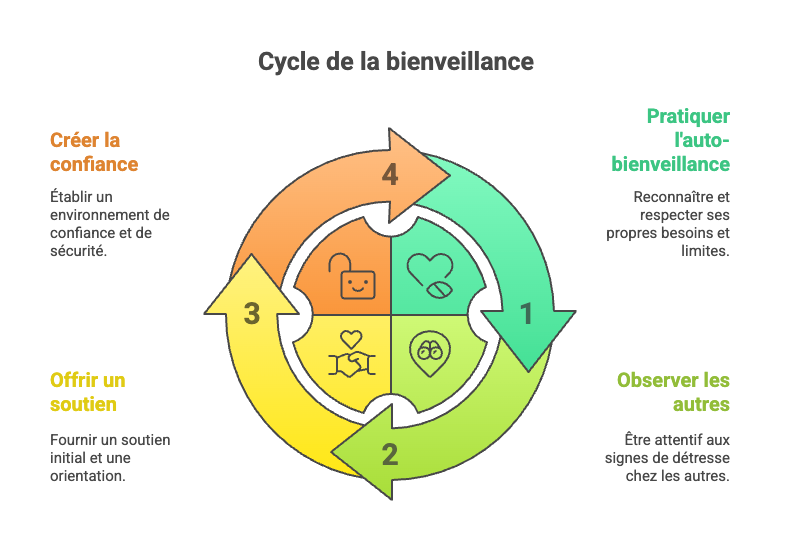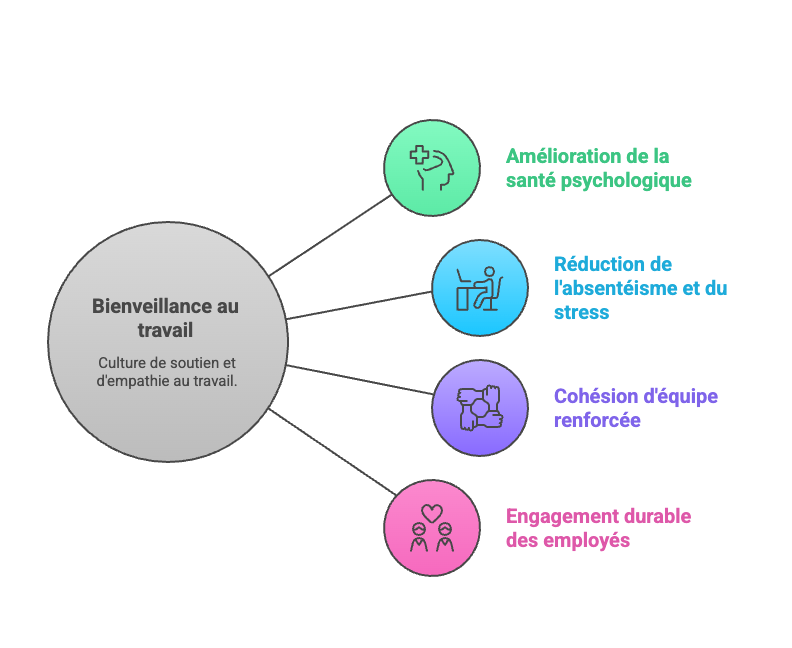In a professional world where demands are constantly changing, the psychological health of teams has become a priority. And what if part of the solution lay in a simple, human gesture accessible to all: kindness?
Cultivating benevolence means creating an environment where everyone feels listened to, respected and supported. It’s also one of the most powerful levers for preserving psychological health in the workplace, from the very first signs of imbalance. Being benevolent does not mean becoming an intervener or an expert in psychological health. Nor does it mean taking responsibility for the well-being of others.
Rather, it’s a matter of adopting small, caring reflexes, while respecting one’s limits, that help create a climate of trust. These simple yet powerful gestures can help you spot the first signs of distress – and then, if necessary, direct you to the right resources.

Caring begins at home
Before we can be kind to others, it’s essential to be kind to ourselves. All too often, we neglect our own inner state in our desire to be present for others. But kindness is a posture that must first be cultivated internally.
This means:
- Acknowledge your limits, without guilt
- Learn to say no when necessary, to preserve your balance
- Give yourself the right to make mistakes, as you would with a colleague
- Ask for help when difficulties persist
These are powerful gestures of self-compassion that enable us to better navigate the challenges of everyday life. And above all, by being kind to ourselves, we pave the way for a more authentic and lasting kindness towards others.
A few simple gestures can make all the difference
Here are some examples of benevolent vigilance gestures that every member of a team can adopt, without any specialized training:
- Say hello, for real: Say hello, ask a real question (“How are you feeling this week?”), take a few seconds to listen to the answer. These micro-interactions have a real effect on the feeling of belonging.
- Observe gently: A change in mood, a withdrawal, unusual tension? Noticing it, without judging, and keeping an open door to dialogue can be enough to create a safe space. If you need help, talk to your manager or contact your Employee Assistance Program (EAP).
- Encourage breaks: Grabbing a coffee together, or simply taking a step back with a colleague, can help ease tensions before they build up.
- Normalizing discussions about mental health: Sharing a real-life experience, naming a stressful moment, talking about mental load… these authentic gestures foster a culture where everyone feels authorized to be real.
- Taking an interest in others, without expectations: Caring also means respecting everyone’s rhythm. Offering a listening space without forcing an exchange is sometimes the best way to support a colleague.
And if you're worried?
Remember: team members are not psychological health professionals.
When the situation seems worrying, or when you don’t know how to act, it’s essential to refer the person concerned to a competent resource, such as a manager, an HR professional or your Employee Assistance Program (EAP).
Our team is offering a one-day training course to equip psychological health referral agents. Without being interveners, these agents become key resource people, capable of spotting early signals and directing their colleagues to the right resources, such as the EAP.

The benefits of a caring environment
Establishing a culture of benevolence within a team encourages :
- Better overall psychological health
- Reduced absenteeism and chronic stress
- Stronger team cohesion
- Lasting employee commitment
And above all, it helps to humanize work in a context where performance is often the main concern.
Conclusion: Benevolence, a lever for sustainable prevention
Cultivating benevolence means investing in a culture of gentle prevention, where everyone can contribute to collective well-being in their own way. By recognizing the first signs of imbalance with empathy, and daring to make simple gestures, teams become more resilient, more supportive, and better equipped to face everyday challenges.
And above all: you’re never alone. When signs persist or doubts arise, the Employee Assistance Program (EAP ) is there to offer confidential, professional and caring support.
Various training courses can be offered in your workplace. View our complete catalog here or contact us for more information.
